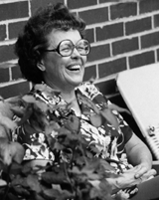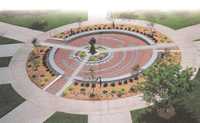
Beatrice Pruden Skeen
is honored with a Brick from Beth Alexander and Anita Skeen.
 My mother was born into a family of women. Her father drowned in the autumn before she was born, in Michigan, while he was away on mining company business. He was in a boat with his employer, the man's wife, and child. His employer decided to go for a swim, was overcome with cramps, and began to sink. My mother's father, an excellent swimmer, jumped in to save him. The man pulled my mother's father beneath the water, and both men drowned. Her father left behind a 23 year old wife and two small daughters. When my mother was born on the 27th of March 1923, she was born to a widowed mother and two young sisters. My grandmother never remarried, and until my mother's sisters both married and left home during World War II, my mother lived in that community of women. At age 19, my mother married my father, a handsome young sergeant in the Army, and my grandmother went to live with them. When I was born four years later, our family became three women and my father. So, from the beginning, my history is a history of women.
My mother was born into a family of women. Her father drowned in the autumn before she was born, in Michigan, while he was away on mining company business. He was in a boat with his employer, the man's wife, and child. His employer decided to go for a swim, was overcome with cramps, and began to sink. My mother's father, an excellent swimmer, jumped in to save him. The man pulled my mother's father beneath the water, and both men drowned. Her father left behind a 23 year old wife and two small daughters. When my mother was born on the 27th of March 1923, she was born to a widowed mother and two young sisters. My grandmother never remarried, and until my mother's sisters both married and left home during World War II, my mother lived in that community of women. At age 19, my mother married my father, a handsome young sergeant in the Army, and my grandmother went to live with them. When I was born four years later, our family became three women and my father. So, from the beginning, my history is a history of women.
Perhaps something about that father, drowned trying to save another man, resurfaced in my mother's genes even before birth, while she swam in my grandmother's womb. My grandmother became a survivor, as did all her daughters, but my mother also adapted to her own life the compassion for and desire to help others. My aunts tell the story of a starving cat my mother brought home, during the Depression, when the mother and three daughters barely had enough for themselves to eat, and how my mother cared for and protected that cat, nursing it to health. One of the greatest gifts I got from my mother was her love of animals, her ability to communicate with them, her capacity for loving them. She extends this kindness and generosity to people in a way I will never be able to. My mother raised me in the Evangelical United Brethren Church and her life, and that of my father's, have always been guided by Christian principles, the greatest of which is love. Though I long ago left the church and am, more often than not, probably guided by the Old Testament adage of "An eye for an eye and a tooth for a tooth," my mother sails into her later years on the philosophy of "Love thy neighbor" and "Do unto others as you would have them do unto you."
Besides exhibiting great generosity of spirit, my mother also taught me that women were strong, that they were intelligent, that they could do whatever they wanted. I was probably a teenager before I realized that there where people out in the world who could be hired to fix things, that not everyone did everything themselves. My father constructed and wired and painted and plumbed and tinkered. My mother cooked and sewed and painted and planted and dreamed. Together, they were unstoppable. They could do anything. In addition, my mother was one of the few women who, in 1952 when I entered first grade, worked outside the home. In fact, for most of my elementary school years I was the only kid in my class whose mother had a job. She was a legal secretary, and worked for the same law firm for over thirty years, when she along with my father who worked at a chemical plant, retired to Florida. When my mother left the law firm, her bosses closed the firm and retired too. I knew why. She was the one who knew how to do it. What could they do without her?
Two other things my mother gave me were her love of travel and her belief in the power of education. I see these two often now as intertwined when I think of the summer vacations with my parents spent in places from Appomattox Courthouse to The World's Largest Hand Dug Well in Greensburg, Kansas, from Niagara Falls to the Grand Canyon, from the San Diego Zoo to Monticello. By the time I went to college, I had traveled in 43 states. Not bad for a kid from Big Chimney, West Virginia, whose parents had only high school educations. My mother used to proudly state that one of my aunts was the smartest girl in her secretarial classes in high school and that my other aunt could have had any job she wanted when she graduated. If my mother had been able to afford to go to college, she would have become a teacher of Home Economics, she told me. I could look into that impossible future and see her students turning out perfect angel food cakes, perfectly souffled souffles, rolls with the right amount of rise, pies with translucent crusts. They would also sew skirts with perfectly even hems and dresses with sleeves of matching lengths. I would not be among those girls, however. I would be out on the baseball diamond sliding into third base, ripping a hole in the seat of my jeans that someone, but not me, would have to sew. Because my mother, and my father, worked hard at jobs that were not the ones, in an ideal world, they would have chosen, they were able to save the money to send me to college. They never said "if you go to college," they only said "when." As a result, I never thought "if," only "when."
Now I am Professor of English at Michigan State University, one of the largest institutions of higher learning in the country. I am a poet, a teacher, a reader, a traveler. I have taught in England and Ireland, land of my mother's mother's ancestors, land of women who do not give up, even when war and famine surround them. I am a feminist, and though my mother would not claim to be one, it is because of her example throughout my life that I came to appreciate the strength of women, the independence of women, the power a community of women can have. I know there is a brick in this Plaza of Heroines that bears my name, that was placed here by former students of mine, and that brick would not be here if it were not for the love and influence of my mother in my life, the determination and perseverance she taught me, the example she gave me. This brick is for my mother, Beatrice Elaine Pruden Skeen, and therefore, for others.
Submitted by Anita Skeen
When I was 35, I met Bea Skeen, mother of my friend Anita. She took me into her home, with my two teenage sons, as if I were part of her family. I have come to claim her as my other mother since my first visit in 1982. That first time I stayed in her home, I was struck by the strength of purpose which Bea applied to all activities. All missions, from practicing her solos for the church choir to "backseat driving" from the passenger seat with her husband driving on the freeway, were done with a sense of determination from which she would not be distracted. I noted that Bea took care of everyone in the house, cooking, mending, arranging schedules, and talking to my children. I knew after that first visit what it was like to have a mother involved in one's life.
That she has become--a substitute mother for what I never had in younger years. One who is always there, one who tells me exactly what she thinks, one who trusts me enough to let me care back, one who stays in touch predictably. For me, she is a testimony of strength, a monument to moving mountains by sheer force of will. Of notable contemporary women, she reminds me of Janet Reno, our current attorney general. She tells it like it is, won't be badgered into compromises that she feels aren't right, and above all else, won't ever distort the truth to benefit herself. She is a Democrat in Republican clothing, a Southern Baptist with Quaker sensitivities, a working class woman with pragmatic good taste, a high school graduate with doctoral level questions and interests.
The other quality that I have come to know, respect and enjoy about Bea is her love of animals. She taught one of her early dogs to ring the doorbell when he wanted in, she taught another dog to sit on the roof and wait for her return home after work, she taught another to bring her his supper dish at 6 pm, and she taught an injured heron to take turkey wieners out of her hand. This same bird, she taught to go to the neighbors for food when she was on vacation. When I watch her with animals, I know that her love and understanding of them is a special gift. If there is a heaven, Bea Skeen will go to the room where there are many strong women and lots of animals. I have been blessed to have her as my other mother.
Submitted by Beth Alexander
June 1, 1998










